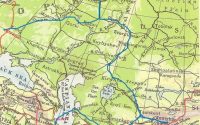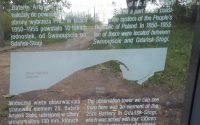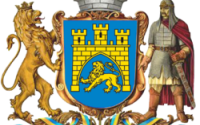Re-connection: Part 1
The weeks spent in Poland and Germany were, I believe, a re-connection or more appropriately a resumption of a connection. By mid-October 2017, I had been back in Britain a couple of weeks and faced interest from family, friends and colleagues all eager to learn about my thoughts on my time in Germany and Poland. I replied firstly in generalisations because, truthfully,I had no specific thoughts at that particular moment because I needed time to absorb all that had occurred. What I did perceive right away in Britain was an ambivalence many people seemed to have towards each other. I noticed it particularly terms of quality, attitude and service. Was it smug complacency or smug superiority? These traits were about to fracture the United Kingdom in a way hitherto unimaginable. Anti-European sentiments had festered on the sidelines among a minority for many years. Hubris that Great Britain or more specifically England was a disorientated vessel bobbing on the seas of globalisation. These sentiments wailed the loss of Empire, of power, of grandeur. They would find voice in sections of the media intent on shoving agenda-driven anti-European propaganda on their front pages. A fallen lit cigarette that lands on a carpet can cause a conflagration. So often in human history the insignificant wanders unremarked but in this case that same media became the oxygen that would ignite populism, anger, hatred. Is it a trait of living on an island such as Great Britain? Too sweeping a statement perhaps, but what I think has happened is twofold. Half of the population, left behind by the system by both political parties has been fed negative attitudes about our European neighbours by sections of the media, who ought to know better. These same sections supported those who perpetrated economic stagnation across swathes of the country blaming instead the European institutions and therein lies the complacency and sense of superiority. And they have the audacity to presume to educate the ‘left-behinds’ who are not stupid but desperate. Meanwhile, the outward-looking half of the island is drowned out. Islanders can be most resistant to change and dare I say, that because Britain escaped the worst atrocities of WW2, it has a air of exceptionalism in it’s view of the world. Secondly, the United Kingdom is fragmenting. Scotland has rediscovered its nationhood and in doing so has opened its doors is to everyone. Northern Ireland, for so long divided by religion is moving in the same direction as Scotland. It’s vote in the 2016 transcended religion. For England there is a real crisis; one of identity. Its citizens forgot they were English. What should have been a positive celebration of the contribution Englishness has given to Europe has evolved into not patriotism but violent nationalism. It was there decades ago when English football thugs trashed bars and cafés across Europe at away matches.
When my father settled in Britain and acquired citizenship, he remarked how moderate and tolerant the British were. Patriotism supplanted nationalism whereas in mainland Europe both were conflated. Patriotism is love of one’s country and an eagerness to exchange cultural mores with outsiders. Patriots can still recognise flaws and wrongdoing in their country’s past and by acknowledging it makes them no less patriotic. Today nationalism is undermining patriotism. Outward-looking patriots are now labelled traitors or ‘the enemy within.’
For me the connection to Poland remains strong. I felt that after I visited my grandfather’s grave. Had my father returned to Poland in 1945 or been repatriated in 1947, he would either have been sent to a labour camp or executed because in the eyes of the Stalinist Polish regime he would have been viewed as a collaborator of the West or a traitor for not remaining in Poland to fight the occupiers on the Soviet side and also because he would not have been regarded as one of the proletariat. Many officers who were imprisoned by the Germans faced this fate on their return, especially if they were of the pre-war officer class which my grandfather undoubtedly was. What puzzles me about my grandfather is that after repatriation when he was resettled in Walcz, he was employed as an accountant with the forestry commission which would have been an important position. In addition, his gravestone was commissioned and provided by the Polish equivalent of the British Legion. How did he manage that where others met a less fortunate fate? Why did both he and my grandmother deny each other was still alive when they knew they were? My gut feeling is that, for his own reasons for which none of us has the right to be judgemental, he joined the Polish Communist Party. Draw your own conclusions – do not be judgemental. How ironic though that father and son would have faced different fates. Collateral war damage.
Two of my sons and myself decided that we wanted to retain our European citizenship after the United Kingdom left the EU and set about the process of applying for Polish citizenship.
Ends.


